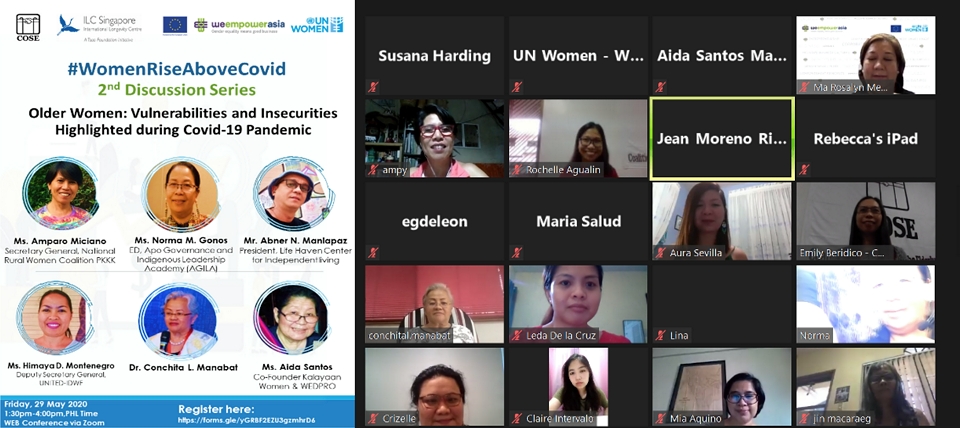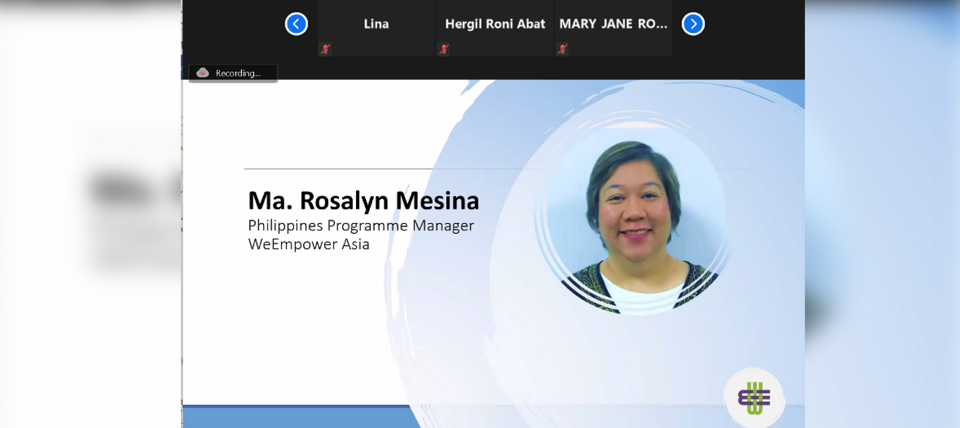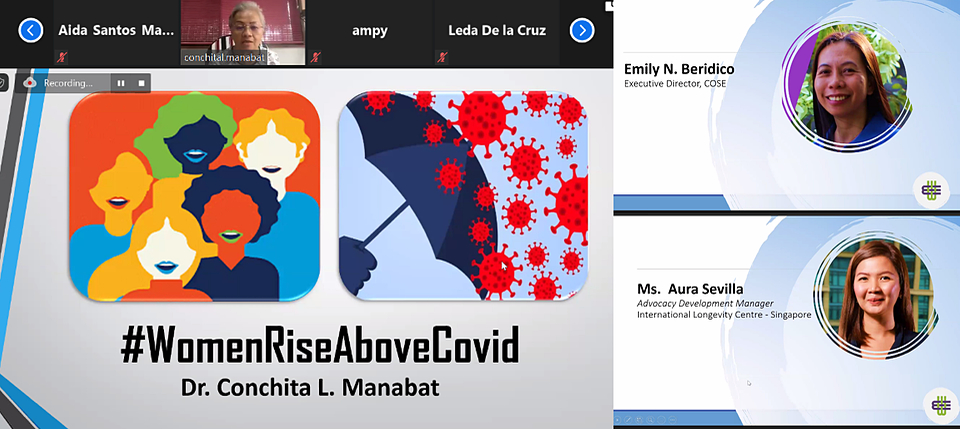Older Filipino women among the most likely to suffer from COVID-19
Of persons affected by the economic and social disruption of COVID-19, the situation has been especially severe for older women in the Philippines.Date:


Manila, Philippines — A virtual forum bringing together experts in ageing and disability has cautioned that social distancing during the crisis must not mean leaving older people behind. They urged a focus on specific interventions for elder women, including persons with disability and mobility problems, and indigenous peoples, who not only face a higher health risk but are potentially struggling to support themselves in isolation, and may need help in obtaining food, medicines and other essential goods and income.
The Coalition of Services of the Elderly (COSE) and International Longevity Centre-Singapore supported by UN Women organized the forum on May 29. Its purpose was to highlight how the virus imposes an extra challenge to older women who already face multiple intersectional disadvantages, mostly informal rural workers with more limited pension and social protection coverage. In some cases, elder women are excluded from government cash aid as their husband already receives contributory pension or if their children work overseas, putting them at risk of poverty, debt and further exclusion.
During the webinar, they also discussed how the joint European Union-UN Women programme WeEmpowerAsia can support them. The EU-funded programme promotes the Women’s Empowerment Principles (WEPs) in seven Asian countries including the Philippines.

Ma. Rosalyn Mesina, WeEmpowerAsia Philippines Programme Manager, UN Women, said, “WeEmpowerAsia intends to find ways to understand and hopefully address the different socioeconomic challenges of women at all ages from all sectors. It is but timely for us to open the conversation how older women are made more vulnerable now than ever because of the COVID-19 pandemic and find ways how we can ensure programmes and policies are in place to support and protect them properly.”

The webinar participants included Aida Santos of WeDpro and Baigani Women Collective, Amparo Miciano of National Rural Women Coalition/PKKK, Norma Gonos of Apo Governance and Indigenous Leadership Academy (AGILA), Abner Manlapaz of Life Haven for Independent Living and Dr. Conchita Manabat of Development Center for Finance. Dr. Conchita echoed key action points to consider when designing policy responses to avoid abandoning older people and remove barriers to a virtuous circle between their economic empowerment and better health.
“Keeping the elderly at home and repeatedly branding them vulnerable may have a negative impact on them,” she said. “Even at old age, they can make important contributions to society if we involve, integrate and ensure they are able to take part in community-based activities.”
Ida Patron, Commissioner of the National Commission for Senior Citizens (NCSC), joined the call for a lifetime, rights-based strategic framework to leave no women behind in economic empowerment. This saw the support of other government institutions such as the Philippine Commission on Women (PCW) and civil society groups. She underlined that elder Filipino women in particular should be empowered through stable and dignified pensions. “They will have a positive outlook on life and see ageing as a normal part of life,” she said.
The webinar also drew important policy recommendations such as the passage of a Universal Social Pension, Universal Disability Allowance, and Magna Carta of Workers in the Informal Economy. Short-term measures include developing information campaigns for indigenous communities, improve access to assistive devices for older persons with disabilities, financial literacy, and inclusion of all older women and men in the emergency relief aid of the government.
For more information, please contact:
Rosalyn Mesina
Country Programme Manager, WeEmpowerAsia Philippines
UN Women
Email: rosalyn.mesina@unwomen.org
About WeEmpowerAsia
WeEmpowerAsia is a joint initiative of the European Union and UN Women aiming to increase the number of women who lead and participate in private-sector businesses for inclusive and sustainable growth in seven Asian countries including the Philippines. With funding and support from the European Union, it translates and articulates commitment under the Women’s Economic Empowerment focus and promotes stronger links between European and Asian markets through gender-sensitive trade and supply chains.
About UN Women
UN Women is the United Nations entity dedicated to gender equality and the empowerment of women. A global champion for women and girls, UN Women was established to accelerate progress on meeting their needs worldwide.
About the Coalition of Services of the Elderly (COSE)
The Coalition of Services of the Elderly (COSE) is a non-governmental organization working to promote community-based programs for the elderly in the Philippines to address issues of poverty, exclusion, and invisibility so they may live in dignity.
About the International Longevity Centre-Singapore
International Longevity Centre-Singapore aims to promote the wellbeing of older people and contribute to national development through initiating research and forging collaborations which inform policy, facilitate policy-action translation and promote quality, effective practice.